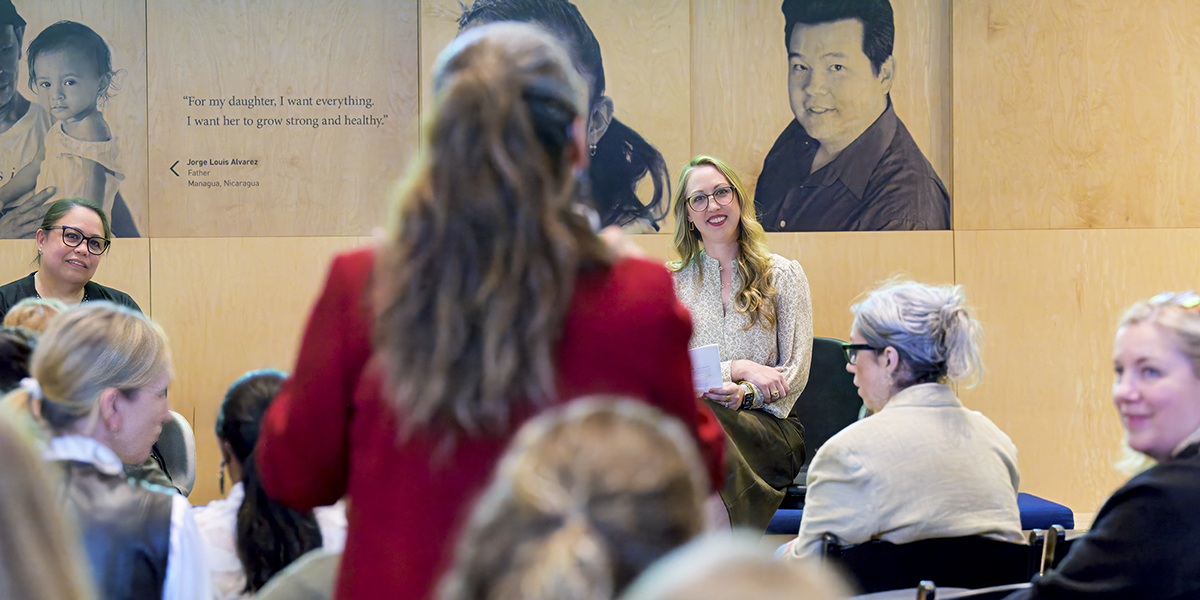Written by Dr. Renee St. Jacques – Photo by Christin Hume
It’s Tuesday morning, you’ve just sat down and opened your laptop. As you take that first sip of coffee, you hear the familiar ping of IM – a message from your manager:
“In our next one–on–one, I’d like to provide you with some feedback”
What is your first thought?
Gulp. “Oh no, she hates me. What did I do? Or not do?… It must have been how I finished that project. The partners were underwhelmed…Oh man, this is it for me. I can’t cut it. I think I’m getting fired. Shoot. What do I do?”
Shoulders by your ears, knot in your stomach. Within seconds, an innocuous message has you gripped by dread.
Why is feedback so difficult and scary?
Psychology reveals that this discomfort is due to how feedback falls at the intersection of two competing human needs: the need to learn and grow, and the need to be worthy and enough without having to change.
Despite almost universal dread, feedback remains a powerful skill in the workplace because our work is only as good as our work with other people. Receiving feedbacks is one way we learn to function better in collective society, whether that be in the workplace, public space, or home, and offers us opportunities to grow.
I recently held a webinar for Lions & Tigers where I drilled into the psychology of feedback and it’s benefits and challenges. Many of the follow-up questions I received were practical in nature, such as what to do in the moment when you receive “bad” feedback.
Here are some of the best practices I recommend my clients for reducing anxiety and reframing feedback as a tool for growth:
Framework: How to receive constructive feedback
When it comes to our locus of control, we must always begin with ourselves. We have agency over how we prepare for, receive, process, and internalize the words of others. This is a prerequisite to forming a healthy response to the person in front of us.
Keep these five perspectives in mind when preparing for or receiving feedback:
- We experience conflicting needs. Recognizing the dual forces at play help us make sense of and endure the internal discomfort of the moment.
- We are not our work. I’ll say it again: we are not our work. Our worth is intact and unchangeable no matter our performance. This may be a hard concept to grasp in our performance-oriented society and will take time to internalize. If you need to, make it a mantra, because this mindset is at the core of how we depersonalize the feedback.
- There is a difference between impact and intention. When providing feedback, the client or colleague is sharing how your actions have had impact on them. This may differ from our intentions, however it’s important to validate their experience of the impact.
- Lean into the discomfort. Even if you need time to process privately, lean in by taking notes during the feedback, asking clarifying questions, coaching the feedback giver to ensure we don’t “keep bad feedback bad” (e.g. if the feedback is vague, ensuring clarity), and sending a recap afterwards so the giver feels heard. Put insecurity on pause for the moment – devote your attention to identifying an insight you can act on for growth.
- Privately process the feedback. It’s normal and natural to feel disoriented, shame, guilt, insecurity, and other uncomfortable emotions. Process that afterward on your own, reflecting on the points above. Doing so gives us the emotional stability, mental clarity, and insight to clearly and confidently reengage with the feedback giver in a professional positive way.
Tips for responding in the moment
It’s empowering to have a framework to go to when processing feedback, but what do we do in the moment while the other person is actively sharing? Especially when you take a while to process or when the feedback is hard to receive?
Remember that, for most people, giving feedback is as uncomfortable as receiving it. To help put everyone at ease, I recommend being cognizant of your body language, composure, and your verbal responses.
Mindful body language
Since most of us are working remotely at this time, feedback is likely being given over video meetings (if feedback is given over channels like chat or email, a follow-up meeting with video is recommended to ensure clarity of communication). Best practices for remote feedback meetings:
- Keep your camera on.
- Try to maintain an attentive yet relaxed posture, as you would in an office setting.
- Give as much eye contact to the camera as possible.
- Also look at the other person’s body language.
A physical posture of calm and comfort helps calm the mind as well, enabling us to be more present and professional throughout the conversation.
Maintain composure
The process of having your work and effort analyzed by another person can be tremendously vulnerable. Even if what they say is positive, it’s normal to feel a rush of emotions such as defensiveness as pent-up anxiety releases.
As you listen, be as calm and open-minded as possible. Remember: you will have time to process and respond later. Your job now is to receive what the other person is saying.
For those of us who find it especially difficult to remain calm in these types of situations, spend more time reflecting on points 1-3 in the above Framework. This helps create a thought pattern that depersonalizes the feedback and helps relieve some of the in-the-moment anxiety.
Helpful phrases while receiving feedback
In some cases, we have an idea of what is coming, but oftentimes feedback sessions will have unexpected information. In addition to being mindful of our body language and composure, we can engage more effectively when we are prepared to respond in any circumstance.
A few phrases that work well:
- Appreciate: “Feedback is a gift, so thank you“
- Clarify: “I would love to learn more about [issue]” or “Can you please give me an example of when I [issue]” or “Can you please define what you mean by [issue]“
- Reflect: “So, what I’m hearing you say is when I ____, that impacts ____ in ____ way“
- Validate: “I want to let you know that I hear and validate your feedback on [issue] and I propose that I try to implement that feedback in [this] way…would that fit your need?“
- Take ownership: “I believe that impact and intention are different, so although I didn’t mean to [issue], I definitely can see that impact and own that” or “I validate that the impact was ____.“
Having some responses ready can help us reclaim agency and reduce insecurity. We step into a conversation that is not centered on criticism and critique, but on understanding, learning, and problem solving. In addition, our ability to listen and respond well in the moment can help put the person giving feedback at ease, lowering walls and creating an environment for greater collaboration.
After all, isn’t the purpose of feedback so that we can work better together?
Next steps
If you believe that this kind of feedback skills and emotional intelligence training would be helpful to you and your team, we’d love to chat! Contact us to learn more about our professional development training and coaching.
 Licensed Psychologist and Exec Coach Dr. Renee St. Jacques is a unique hybrid of human behavior expert and corporate professional, equally compassionate and people-oriented while biased towards action and results-oriented. Her deep experience with technology marketing and product management give her the senior-level perspective to understand the business issues that her clients face daily, while her extensive doctoral training in psychology offers her the intuition and expertise to help support her clients’ workplace relational and emotional intelligence needs.
Licensed Psychologist and Exec Coach Dr. Renee St. Jacques is a unique hybrid of human behavior expert and corporate professional, equally compassionate and people-oriented while biased towards action and results-oriented. Her deep experience with technology marketing and product management give her the senior-level perspective to understand the business issues that her clients face daily, while her extensive doctoral training in psychology offers her the intuition and expertise to help support her clients’ workplace relational and emotional intelligence needs.








0 Comments